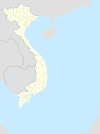Racism in Vietnam
The neutrality of this article is disputed. (July 2017) |
Some of this article's listed sources may not be reliable. (June 2018) |
Racism in Vietnam has been mainly directed by the majority and dominant ethnic Vietnamese Kinh against ethnic minorities such as Degars (Montagnards), Chams and the Khmer Krom.
Chams[]
The Cham in Vietnam are only recognized as a minority, and not as an indigenous people by the Vietnamese government despite being indigenous to central and southern Vietnam. Both Hindu and Muslim Chams have experienced religious and ethnic persecution and restrictions on their faith under the current Vietnamese government, with the Vietnamese state confiscating Cham property and forbidding Cham from observing their religious beliefs. Hindu temples were turned into tourist sites against the wishes of the Cham Hindus. In 2010 and 2013 several incidents occurred in Thành Tín and Phươc Nhơn villages where Cham were murdered by Vietnamese.
Highlanders[]
The Kinh Vietnamese dominated government media propagate negative stereotypes of the highlander ethnic minorities, labeling them as "ignorant", "illiterate", "backward" and claim that they are impoverished and underdeveloped because of their own lack of economic and agricultural skills.[1] The ethnic Kinh settlers in the highlands have negative stereotypes and views of the highlanders with barely any intermarriage and little interaction since they deliberately choose to live in different villages with other ethnic Kinh. The Vietnamese government has promoted the ethnic Kinh migration to the highlands as bringing "development" to the highlanders.[2]
Montagnards[]
Montagnards are made up of many different tribes that are indigenous to the Central Highlands of Vietnam. In the past, Montagnards were referred to as "mọi" (savages), by the Vietnamese.[3][4] Vietnamese textbooks used to describe Montagnards as people with long tails and excessive body hair.[5] Nowadays, the non-offensive term "người Thượng" (highlanders), is used instead.
In 1956, President Ngô Dinh Diêm launched programs to resettle ethnic Kinh Vietnamese and northern ethnic minorities into the central highlands. These programs also sought to assimilate the Montagnards into mainstream Vietnamese society.[6] This was the beginning of the struggle between ethnic Kinh and Montagnards. After the Vietnam war, the government further encouraged the ethnic Kinh to resettle in the highlands to cultivate coffee after the demand for coffee in the world boomed.[7] Approximately 1,000,000 ethnic Kinh were forcibly resettled to the central highlands.[8] This resettlement caused conflict between the ethnic Kinh and Montagnards because the Montagnards believed the ethnic Kinh were encroaching on their land. This conflict lead to resentment from the Montagnards which lead to some deadly protests against the ethnic Kinh.[7]
Montagnards have faced religious persecution from the communist Vietnamese government since the end of the Vietnam war.[9] The Vietnamese government has a list of government-approved religious organizations and requires that all religious groups register with the government. Any religious groups that are considered to be going against national interests are repressed and shut down. The Vietnamese government claim the independent Montagnard religious groups use religion to incite unrest. They use this to justify their capture, detainment, and interrogation of Montagnard political activists, leaders, and shut down of unregistered Montagnard churches. Followers of unregistered churches and religious activists have also been harassed, arrested, imprisoned, or placed under house arrest by authorities.[10][11]
In 2001 and 2004, there were major protests from thousands of Montagnards. They protested against the repression and religious persecution from the Vietnamese government and demanded their land back.[12][13] In 2001, there was a Montagnard independence movement facilitated by MFI members.[14] These protests lead to deaths and mass imprisonments.[15]
Khmer Krom[]
See also[]
References[]
- ^ McElwee, Pamela (2008). ""Blood Relatives" or Uneasy Neighbors? Kinh Migrant and Ethnic Minority Interactions in the Trường Sơn Mountains". Journal of Vietnamese Studies. Regents of the University of California. 3 (3): 81–116. doi:10.1525/vs.2008.3.3.81. ISSN 1559-372X. Retrieved 17 August 2015.
- ^ McElwee, Pamela (2008). ""Blood Relatives" or Uneasy Neighbors? Kinh Migrant and Ethnic Minority Interactions in the Trường Sơn Mountains". Journal of Vietnamese Studies. Regents of the University of California. 3 (3): 83–84. doi:10.1525/vs.2008.3.3.81. ISSN 1559-372X. Retrieved 17 August 2015.
- ^ John Jacob Nutter (2000). The CIA's Black Ops: Covert Action, Foreign Policy, and Democracy. Prometheus Books, Publishers. pp. 160–. ISBN 978-1-61592-397-7.
- ^ David W. P. Elliott (31 December 2002). The Vietnamese War: Revolution and Social Change in the Mekong Delta, 1930-1975. M.E. Sharpe. pp. 1504–. ISBN 978-0-7656-0602-0.
- ^ Haha Lung (2006). Lost Fighting Arts of Vietnam. Citadel. pp. 7–. ISBN 978-0-8065-2760-4.
- ^ "REPRESSION OF MONTAGNARDS". www.hrw.org. Retrieved 2020-11-22.
- ^ a b James Sullivan (2010). National Geographic Traveler Vietnam. National Geographic. pp. 102–. ISBN 978-1-4262-0522-4.
- ^ Spencer C. Tucker (20 May 2011). Encyclopedia of the Vietnam War, The: A Political, Social, and Military History: A Political, Social, and Military History. ABC-CLIO. pp. 182–. ISBN 978-1-85109-961-0.
- ^ Thayer, Nate (25 September 1992). "Lighting the darkness: FULRO's jungle Christians". The Phnom Penh Post.
- ^ "Vietnam: Montagnards Harshly Persecuted". Human Rights Watch. 2011-03-30. Retrieved 2020-11-22.
- ^ "Montagnard Christians in Vietnam". Human Rights Watch. 2011-03-30. Retrieved 2020-11-22.
- ^ McElwee, Pamela (2008). "7 Becoming Socialist or Becoming Kinh? Government Policies for Ethnic Minorities in the Socialist Republic of Viet Nam". In Duncan, Christopher R. (ed.). Civilizing the Margins: Southeast Asian Government Policies for the Development of Minorities. Singapore: NUS Press. p. 182. ISBN 978-9971-69-418-0.
- ^ "Vietnam: Torture, Arrests of Montagnard Christians Cambodia Slams the Door on New Asylum Seekers : II. Recent Arrests and Harassment". www.hrw.org. Retrieved 2020-11-22.
- ^ "REPRESSION OF MONTAGNARDS". www.hrw.org. Retrieved 2020-11-22.
- ^ Bray, Adam (June 16, 2014). "The Cham: Descendants of Ancient Rulers of South China Sea Watch Maritime Dispute From Sidelines". National Geographic News. National Geographic. Retrieved 3 September 2014.
- Human rights abuses in Vietnam
- Demographics of Vietnam
- Racism by country
- Vietnamese culture
- Ethnic conflicts
- Ethnic groups in Vietnam

